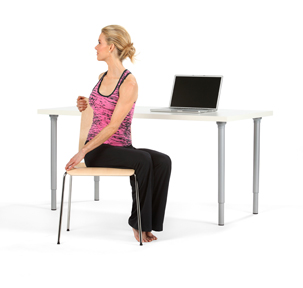Here is you 10 min total body workout, you can do this multiple times a day the trick is to keep moving
4 min Aerobic
Chair jogging alternate 30 second moderate and fast for total of 4 minutes

3 min Resistance 1 min each exercise
Chair squat

Wall Push up

Stionary lung

2 min Core 1 min each
Crunch

Alternate chair side bends , do as many as possible
1min Streatch
Forward bend on chair hold for 30 sec
Side chair twist hold for 1 sec each side

Your done